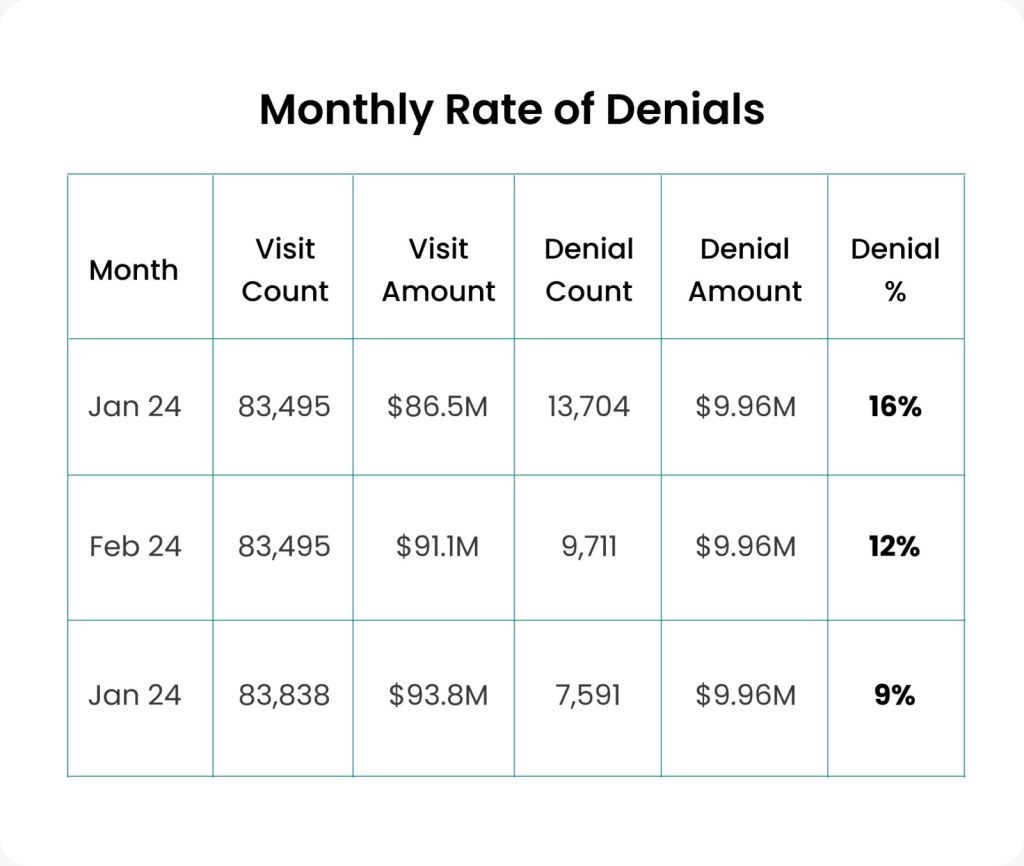Diagnosing and Solving Inefficient
Revenue Cycle Management

Revenue Cycle Management (RCM) is a critical process used by healthcare
organizations to manage the financial aspects of patient care, from the initial
appointment to the final payment of services rendered

The goal of RCM is to ensure timely and efficient payment for healthcare services, minimizing lost revenue and improving overall financial health.
Insurance denials occur when an insurer refuses a medical claim submitted by a healthcare provider. Consequently, healthcare providers must invest time and resources in appealing or resubmitting these claims, a process that can be both timeconsuming and frustrating for all parties. Denied claims will begin to add up, leading to damaging effects on the healthcare provider’s financial stability.
Healthcare organizations must implement a denials strategy to prevent the accumulation of denied claims before it becomes unmanageable. An effective strategy requires involvement from multiple parties across the organization, including the CFO, chief revenue officer, and financial service directors, and more. However, before any strategy can be put into action, it is crucial to identify the root causes of the denials you are facing. To gain deeper insight into how Business Integrity Services diagnoses and resolves Revenue Cycle Management (RCM) issues, continue reading this case study.
Weekly Review and Action Plans
Weekly reviews of denial trends and immediate action plans to address the root causes were implemented.
Denial Rate Reduction
The denial rate decreased from 16% in May 2023 to 7.4% by June 2024.
Reduction in Charge Lag
Charge lag reduced from 39 days to 4 days, allowing for timely review of coding and front end edits, preventing timely filing denials and additional coding denials.
Cost Savings
Maintaining a low denial rate led to cost savings in the labor force for AR management.
Streamlined Workflow Processes
Front end workflow processes in authorizations, verifications, and charge entry were streamlined to effectively decrease the denial rate.
Problem
Before partnering with Business Integrity Services, the leading
pain management medical practice with $57M in annual
revenue, faced a 16% denial rate of claims without an effective denial response strategy. In early 2024, the organization’s financial team noticed the significant rate of denials and recognized the urgent need for a strategy to prevent severe impacts on the organization’s financial health.
As a leading provider of Revenue Cycle Management (RCM) services, BIS identified the need to perform a structured Root Cause Analysis (RCA) for the large pain management organization to effectively improve claim submission accuracy, reduce denials, optimize revenue collection, and enhance overall operational performance. The RCA systematically investigated and identified the underlying factors contributing to RCM denials. The findings provided actionable recommendations aimed at addressing these issues.
Symptoms:
- Delay in receiving
- Increased labor costs
- Aging accounts receivable (AR) and elevated key performance indicators/AR metrics
- Stakeholder dissatisfaction
- Inefficient front end processes in authorizations, verifications, and charge entry
Through this curated process, BIS was able to uncover the root causes of the high denial rate and provide the client with targeted recommendations to improve their RCM processes

Report Compilation
Pulled a report listing denials over the last 12 months, categorizing them by denial type and reason.

Categorization
Listed payers, CPT codes, modifiers, diagnosis codes, providers, locations, and denial codes/reason codes.

AR Reporting Review
Conducted a detailed review of accounts receivable (AR) reporting in comparison to appointments to identify any additional denial opportunities.

Addressing the root cause issues of denials impacting accounts
receivable (AR) resulted in a significant decrease in the overall denial
rate and increased revenue for the client. The denial rate dropped from 16% in January 2024 to 9% by March 2024, demonstrating a striking 7% decrease over a 90 day period. This reduction was achieved through weekly reviews of denial trends and the implementation of immediate action plans to address critical sources that were leading to the denial
of claims.
Also over a 90 day period, the organization reduced its charge lag from 39 days to just 4 days. This significant improvement allowed for faster review of coding and edits, effectively preventing related errors
and keeping denial rates low. As a result, the organization saved on labor costs for leading to a healthier accounts receivable. Additionally, by enhancing processes for authorizations, verifications, and charge entry, the organization further reduced denial rates and improved overall financial performance.
The pain management institute with $57M in annual charges initially struggled with a high denial rate and an inefficient Revenue Cycle Management (RCM) process. The organization attempted to manage the situation internally, but the lack of a structured approach led to
numerous challenges and inefficiencies. Partnering with Business Integrity Services (BIS) marked a turning point. Through a comprehensive Root Cause Analysis (RCA), BIS identified the underlying issues and provided actionable recommendations. The implementation of these
strategies resulted in a significant reduction in the denial rate, improved revenue collection, and streamlined operational processes.
Through 2024 and beyond, BIS will continue to work with the painmanagement organization to reduce their denial rate to 6%, a goal that is below the industry standard, as they have successfully achieved with many other clients.
Corrections & Adjustments
- Eligibility workflows were streamlined
- Electronic medical record attachments were included with the first submission
- Coding edits were made for payerspecific modifiers, CPT codes, and diagnosis related conditions�
- Credentialing issues were identified and resolved in collaboration with client leadership
